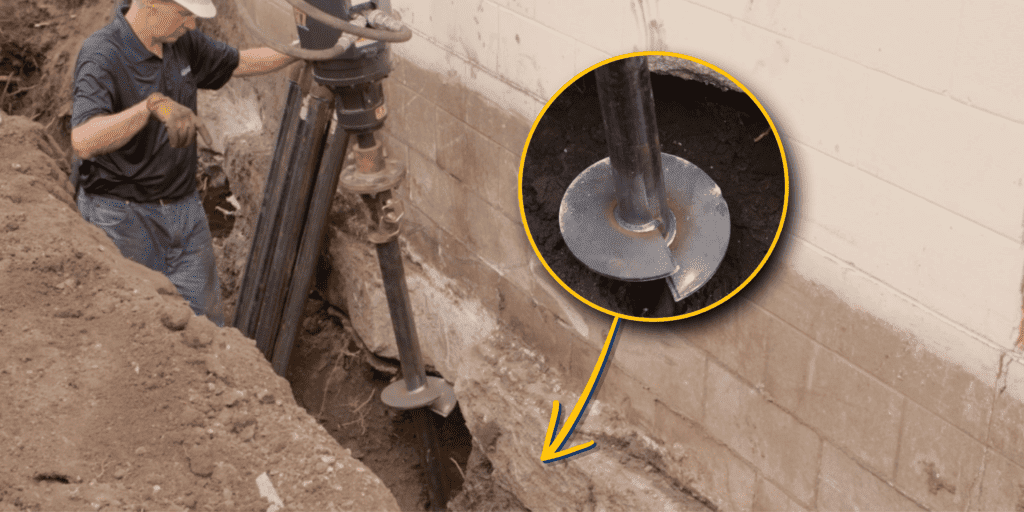Helical Piers Repair: Why They Are Installed
Your home’s foundation is one of the most critical components of your property. It supports the entire structure and keeps it level and stable. However, over time, your foundation may start to settle, shift, or sink. As a result of many reasons, including soil erosion, water damage, tree roots, or poor construction. If you notice signs of foundation problems, such as cracks in the walls or floors, doors and windows that don’t close properly, or unevenness in the structure,. It is a crucial sign to address them promptly before they worsen and compromise your safety and comfort. One of the most effective solutions for foundation issues is a helical pier repair.
Helical piers, also known as helical anchors, helical piles, or screw piles, are steel shafts with helix plates. Our team screws the piers into the ground until they reach a stable soil layer or rock formation. The helix plates provide support and resistance to uplift and lateral forces, while the shaft transfers the load from the structure to the soil. The crew installs helical piers with specialized equipment and techniques. This minimizes disruption to your property. Our team at TFS ensures accurate placement and alignment.
Benefits of Helical Piers
Helical pier repairs offer several advantages over traditional foundation repair methods, such as concrete underpinning or mudjacking. Some of the benefits of helical piers include:
Cost-effectiveness:
- Helical piers are often more affordable than other methods, especially when considering the long-term benefits and durability.
Adaptability:
- Our crew customizes helical pier repairs to suit different soil and site conditions. The repair is suitable for tight or restricted spaces.
Speed:
- The team strives to install helical piers quickly and efficiently. Usually, in a matter of hours or days, depending on the project size and complexity.
Minimal excavation:
- A helical pier repair requires little to no excavation, which means less mess, debris, and landscape damage. They can also be installed in areas with limited access or clearance.
Structural stability:
- Helical piers provide reliable support and reinforcement to your foundation, ensuring that it stays level and secure for decades to come.
Waterproofing:
- A helical pier repair can also serve as a barrier against water intrusion and moisture damage, as they prevent the soil from expanding or contracting due to seasonal changes or fluctuations.
Limits of Helical Piers versus Push Piers
While helical pier repairs are a highly effective solution for foundation repair, it’s important to understand their limitations compared to push piers. Push piers, also known as resistance piers or steel piers, are another popular choice for stabilizing foundations. While both helical piers and push piers can address foundation settlement issues, they have some key differences.One significant limitation of helical pier repairs is their suitability for certain soil conditions. Helical pier repairs perform exceptionally well in soils with good load-bearing capacity, such as clay, silt, or sandy soils. However, they may not be as effective in dense or rocky soils where the helices struggle to penetrate or gain sufficient anchoring. In such cases, push piers, which rely on driving steel pipes deep into the ground until they reach a stable soil layer, may be a more suitable alternative.
When to Choose Helical Piers over Push Piers
While push piers have their advantages in specific soil conditions, helical piers offer unique benefits that make them the preferred choice in many scenarios. When should you use helical piers over push piers in your home?
Soil conditions:
- As mentioned earlier, helical piers excel in soils with good load-bearing capacity, such as clay, silt, or sandy soils. If your property is situated in an area with these soil types, helical pier repairs can provide excellent stability and support.
Limited access:
- If your foundation is located in a tight or restricted space, helical piers are often the better option. Their installation requires minimal excavation and can be performed with smaller equipment, allowing access to areas where push piers may not be feasible.
Lighter loads:
- Helical pier repairs are ideal for structures with lighter loads, such as residential homes or small commercial buildings. They are designed to support and stabilize these structures effectively.
Sloping terrain:
- If your property is built on a slope, helical piers can accommodate the uneven terrain. Their helix plates enable them to adapt to different angles and provide consistent support across the foundation.
Expansive soils:
- In regions where soil expansion and contraction due to moisture changes are common, helical pier repairs can help mitigate the potential damage. They minimize the impact of soil movements and provide long-term stability.
When considering foundation repair options, it’s crucial to consult with a professional contractor who specializes in both helical piers and push piers. They will assess your specific situation, soil conditions, and structural requirements to determine the most suitable solution for your home or building.
What Now?
TFS, The Foundation Specialists, is the preferred company to install this product because of our many years of expertise and knowledge of the product itself. We offer a free inspection and lifetime warranty on this product. Call us and speak to our in-house customer care team, who will answer your questions and pair you with a foundation specialist.
For regular tips and industry updates, follow us on Instagram and Facebook.

